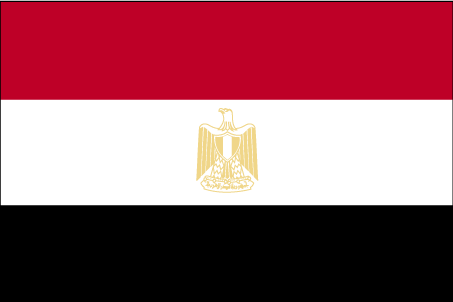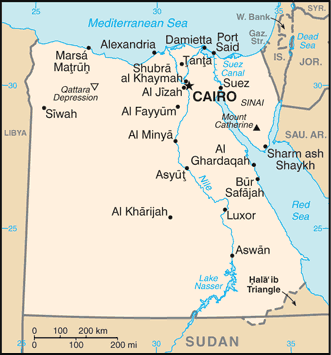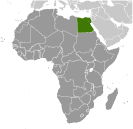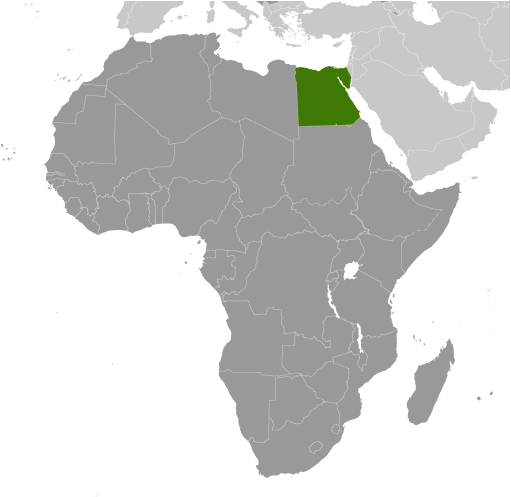|

Administrative divisions (GPS Maps)
Geography
People and Society
Government
Economy
Communications
Transportation
Military |
 |
 The regularity and richness of the annual Nile River flood, coupled with semi-isolation provided by deserts to the east and west, allowed for the development of one of the world's great civilizations. A unified kingdom arose circa 3200 B.C., and a series of dynasties ruled in Egypt for the next three millennia. The last native dynasty fell to the Persians in 341 B.C., who in turn were replaced by the Greeks, Romans, and Byzantines. It was the Arabs who introduced Islam and the Arabic language in the 7th century and who ruled for the next six centuries. A local military caste, the Mamluks took control about 1250 and continued to govern after the conquest of Egypt by the Ottoman Turks in 1517. Following the completion of the Suez Canal in 1869, Egypt became an important world transportation hub, but also fell heavily into debt. Ostensibly to protect its investments, Britain seized control of Egypt's government in 1882, but nominal allegiance to the Ottoman Empire continued until 1914. Partially independent from the UK in 1922, Egypt acquired full sovereignty with the overthrow of the British-backed monarchy in 1952. The completion of the Aswan High Dam in 1971 and the resultant Lake Nasser have altered the time-honored place of the Nile River in the agriculture and ecology of Egypt. A rapidly growing population (the largest in the Arab world), limited arable land, and dependence on the Nile all continue to overtax resources and stress society. The government has struggled to meet the demands of Egypt's growing population through economic reform and massive investment in communications and physical infrastructure. Egyptian youth and opposition groups, inspired by events in Tunisia leading to overthrow of the government there, organized a "Day of Rage" campaign on 25 January 2011 (Police Day) to include non-violent demonstrations, marches, and labor strikes in Cairo and other cities throughout Egypt. Protester grievances focused on police brutality, state emergency laws, lack of free speech and elections, high unemployment, rising food prices, inflation, and low minimum wages. Within several days of the onset of protests, President MUBARAK addressed the nation pledging the formation of a new government, and in a second address he offered additional concessions, which failed to assuage protesters and resulted in an escalation of the number and intensity of demonstrations and clashes with police. On 11 February MUBARAK resigned and national leadership was assumed by a Supreme Council of Armed Forces (SCAF). The SCAF dissolved the Egyptian parliament, suspended the nation's constitution, and formed a committee to recommend constitutional changes to facilitate a political transition through democratic elections. Following some delays, elections for a new parliament took place between November 2011 and January 2012. Presidential elections held in May and June witnessed the victory of Muslim Brotherhood candidate Mohammed MURSI over former Prime Minister Ahmed SHAFIQ. The regularity and richness of the annual Nile River flood, coupled with semi-isolation provided by deserts to the east and west, allowed for the development of one of the world's great civilizations. A unified kingdom arose circa 3200 B.C., and a series of dynasties ruled in Egypt for the next three millennia. The last native dynasty fell to the Persians in 341 B.C., who in turn were replaced by the Greeks, Romans, and Byzantines. It was the Arabs who introduced Islam and the Arabic language in the 7th century and who ruled for the next six centuries. A local military caste, the Mamluks took control about 1250 and continued to govern after the conquest of Egypt by the Ottoman Turks in 1517. Following the completion of the Suez Canal in 1869, Egypt became an important world transportation hub, but also fell heavily into debt. Ostensibly to protect its investments, Britain seized control of Egypt's government in 1882, but nominal allegiance to the Ottoman Empire continued until 1914. Partially independent from the UK in 1922, Egypt acquired full sovereignty with the overthrow of the British-backed monarchy in 1952. The completion of the Aswan High Dam in 1971 and the resultant Lake Nasser have altered the time-honored place of the Nile River in the agriculture and ecology of Egypt. A rapidly growing population (the largest in the Arab world), limited arable land, and dependence on the Nile all continue to overtax resources and stress society. The government has struggled to meet the demands of Egypt's growing population through economic reform and massive investment in communications and physical infrastructure. Egyptian youth and opposition groups, inspired by events in Tunisia leading to overthrow of the government there, organized a "Day of Rage" campaign on 25 January 2011 (Police Day) to include non-violent demonstrations, marches, and labor strikes in Cairo and other cities throughout Egypt. Protester grievances focused on police brutality, state emergency laws, lack of free speech and elections, high unemployment, rising food prices, inflation, and low minimum wages. Within several days of the onset of protests, President MUBARAK addressed the nation pledging the formation of a new government, and in a second address he offered additional concessions, which failed to assuage protesters and resulted in an escalation of the number and intensity of demonstrations and clashes with police. On 11 February MUBARAK resigned and national leadership was assumed by a Supreme Council of Armed Forces (SCAF). The SCAF dissolved the Egyptian parliament, suspended the nation's constitution, and formed a committee to recommend constitutional changes to facilitate a political transition through democratic elections. Following some delays, elections for a new parliament took place between November 2011 and January 2012. Presidential elections held in May and June witnessed the victory of Muslim Brotherhood candidate Mohammed MURSI over former Prime Minister Ahmed SHAFIQ. |
|
Advertisements
|
Advertisements
|
Telephones - main lines in use World Ranking: 23
8.714 million (2011)
Telephones - mobile cellular World Ranking: 15
83.425 million (2011)
Telephone system
General assessment Underwent extensive upgrading during 1990s; principal centers at Alexandria, Cairo, Al Mansurah, Ismailia, Suez, and Tanta are connected by coaxial cable and microwave radio relay Domestic Largest fixed-line system in the region; as of 2011 there were multiple mobile-cellular networks with a total of roughly 83 million subscribers International Country code - 20; landing point for Aletar, the SEA-ME-WE-3 and SEA-ME-WE-4 submarine cable networks, Link Around the Globe (FLAG) Falcon and FLAG FEA; satellite earth stations - 4 (2 Intelsat - Atlantic Ocean and Indian Ocean, 1 Arabsat, and 1 Inmarsat); tropospheric scatter to Sudan; microwave radio relay to Israel; a participant in Medarabtel (2011)
Broadcast media
Mix of state-run and private broadcast media; state-run TV operates 2 national and 6 regional terrestrial networks as well as a few satellite channels; about 20 private satellite channels and a large number of Arabic satellite channels are available via subscription; state-run radio operates about 70 stations belonging to 8 networks; 2 privately-owned radio stations operational (2008)
Internet country code
.eg
Internet hosts World Ranking: 70
200,336 (2010)
Internet users World Ranking: 21
20.136 million (2009)
--- There are no comments yet ---
Add a new comment:
|
Advertisement
Members area
Egypt (Cairo):
GPS points from Egypt (Cairo)
|




 The regularity and richness of the annual Nile River flood, coupled with semi-isolation provided by deserts to the east and west, allowed for the development of one of the world's great civilizations. A unified kingdom arose circa 3200 B.C., and a series of dynasties ruled in Egypt for the next three millennia. The last native dynasty fell to the Persians in 341 B.C., who in turn were replaced by the Greeks, Romans, and Byzantines. It was the Arabs who introduced Islam and the Arabic language in the 7th century and who ruled for the next six centuries. A local military caste, the Mamluks took control about 1250 and continued to govern after the conquest of Egypt by the Ottoman Turks in 1517. Following the completion of the Suez Canal in 1869, Egypt became an important world transportation hub, but also fell heavily into debt. Ostensibly to protect its investments, Britain seized control of Egypt's government in 1882, but nominal allegiance to the Ottoman Empire continued until 1914. Partially independent from the UK in 1922, Egypt acquired full sovereignty with the overthrow of the British-backed monarchy in 1952. The completion of the Aswan High Dam in 1971 and the resultant Lake Nasser have altered the time-honored place of the Nile River in the agriculture and ecology of Egypt. A rapidly growing population (the largest in the Arab world), limited arable land, and dependence on the Nile all continue to overtax resources and stress society. The government has struggled to meet the demands of Egypt's growing population through economic reform and massive investment in communications and physical infrastructure. Egyptian youth and opposition groups, inspired by events in Tunisia leading to overthrow of the government there, organized a "Day of Rage" campaign on 25 January 2011 (Police Day) to include non-violent demonstrations, marches, and labor strikes in Cairo and other cities throughout Egypt. Protester grievances focused on police brutality, state emergency laws, lack of free speech and elections, high unemployment, rising food prices, inflation, and low minimum wages. Within several days of the onset of protests, President MUBARAK addressed the nation pledging the formation of a new government, and in a second address he offered additional concessions, which failed to assuage protesters and resulted in an escalation of the number and intensity of demonstrations and clashes with police. On 11 February MUBARAK resigned and national leadership was assumed by a Supreme Council of Armed Forces (SCAF). The SCAF dissolved the Egyptian parliament, suspended the nation's constitution, and formed a committee to recommend constitutional changes to facilitate a political transition through democratic elections. Following some delays, elections for a new parliament took place between November 2011 and January 2012. Presidential elections held in May and June witnessed the victory of Muslim Brotherhood candidate Mohammed MURSI over former Prime Minister Ahmed SHAFIQ.
The regularity and richness of the annual Nile River flood, coupled with semi-isolation provided by deserts to the east and west, allowed for the development of one of the world's great civilizations. A unified kingdom arose circa 3200 B.C., and a series of dynasties ruled in Egypt for the next three millennia. The last native dynasty fell to the Persians in 341 B.C., who in turn were replaced by the Greeks, Romans, and Byzantines. It was the Arabs who introduced Islam and the Arabic language in the 7th century and who ruled for the next six centuries. A local military caste, the Mamluks took control about 1250 and continued to govern after the conquest of Egypt by the Ottoman Turks in 1517. Following the completion of the Suez Canal in 1869, Egypt became an important world transportation hub, but also fell heavily into debt. Ostensibly to protect its investments, Britain seized control of Egypt's government in 1882, but nominal allegiance to the Ottoman Empire continued until 1914. Partially independent from the UK in 1922, Egypt acquired full sovereignty with the overthrow of the British-backed monarchy in 1952. The completion of the Aswan High Dam in 1971 and the resultant Lake Nasser have altered the time-honored place of the Nile River in the agriculture and ecology of Egypt. A rapidly growing population (the largest in the Arab world), limited arable land, and dependence on the Nile all continue to overtax resources and stress society. The government has struggled to meet the demands of Egypt's growing population through economic reform and massive investment in communications and physical infrastructure. Egyptian youth and opposition groups, inspired by events in Tunisia leading to overthrow of the government there, organized a "Day of Rage" campaign on 25 January 2011 (Police Day) to include non-violent demonstrations, marches, and labor strikes in Cairo and other cities throughout Egypt. Protester grievances focused on police brutality, state emergency laws, lack of free speech and elections, high unemployment, rising food prices, inflation, and low minimum wages. Within several days of the onset of protests, President MUBARAK addressed the nation pledging the formation of a new government, and in a second address he offered additional concessions, which failed to assuage protesters and resulted in an escalation of the number and intensity of demonstrations and clashes with police. On 11 February MUBARAK resigned and national leadership was assumed by a Supreme Council of Armed Forces (SCAF). The SCAF dissolved the Egyptian parliament, suspended the nation's constitution, and formed a committee to recommend constitutional changes to facilitate a political transition through democratic elections. Following some delays, elections for a new parliament took place between November 2011 and January 2012. Presidential elections held in May and June witnessed the victory of Muslim Brotherhood candidate Mohammed MURSI over former Prime Minister Ahmed SHAFIQ.